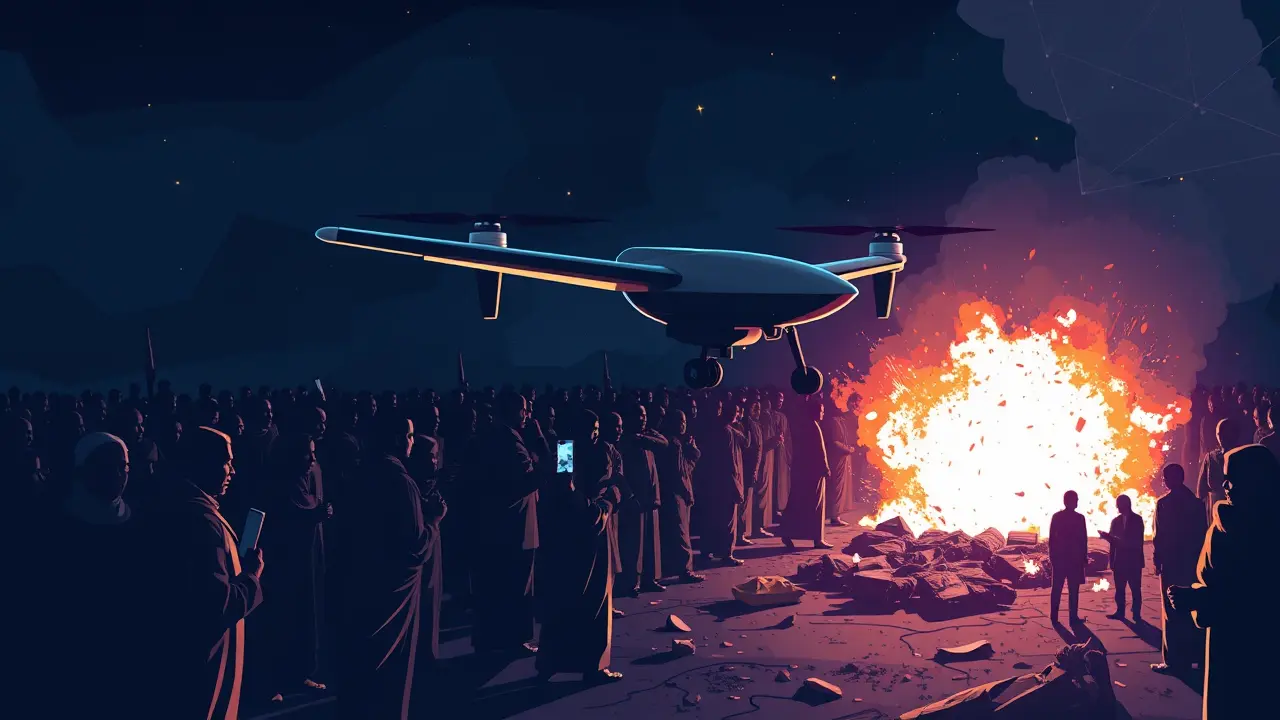
Politicsconflict & defenseMilitary Operations
Drone Strike on Sudan Funeral Kills Many Mourners.
EM
Emma Wilson
13 hours ago7 min read2 comments
The images emerging from Sudan are not just statistics; they are a gut-wrenching assault on our collective humanity. A funeral procession, a sacred gathering of mourners already bowed by grief, was abruptly transformed into a scene of unspeakable carnage by a drone strike, an act of remote-controlled brutality that has sent shockwaves far beyond the oil-rich, war-torn fields of Kordofan.Eyewitness accounts, pieced together through frantic, crackling phone lines and grainy social media footage that feels both vital and violating to watch, describe a scene of pure chaos—the peaceful, solemn rhythm of a burial ritual shattered by the sudden, unseen whir of an engine and the subsequent, earth-shattering explosion that tore through the crowd, leaving dismembered bodies and a community’s spirit in tatters. The Rapid Support Forces (RSF), the powerful paramilitary group born from the Janjaweed militias of the Darfur genocide and now locked in a vicious, year-long power struggle with the Sudanese Armed Forces for control of the nation’s soul, has been immediately and universally blamed for this atrocity.This is not an isolated incident but a terrifying escalation in a conflict that has already displaced millions and pushed a nation to the brink of famine, a calculated move that signals a chilling disregard for the very concept of human sanctity. The strategic importance of Kordofan, with its lucrative oil fields and agricultural heartland, cannot be understated; it is a prize worth bleeding for in the eyes of warlords, and this attack appears designed to terrorize the local population into submission, to break their will by demonstrating that nowhere is safe—not even in their most vulnerable moments of collective mourning.We must understand the RSF not as a rogue element but as a highly organized military entity with deep roots in a history of systematic violence, a force that has perfected the art of sowing terror from the skies, a tactic horrifyingly reminiscent of the conflicts in Yemen and Nagorno-Karabakh where drone warfare has rewritten the rules of engagement with devastating consequences for civilians. The international response, thus far, has been a predictable chorus of condemnation from the UN and Western capitals, but these words ring hollow against the roar of explosions and the silent tears of new orphans.The grim reality is that the world’s attention is fractured, and Sudan’s agony is being overshadowed, leaving its people trapped in a geopolitical vacuum where aid is blocked, diplomacy stalls, and warlords operate with a sense of impunity. The consequences of this specific strike will ripple outwards, further poisoning any chance of near-term peace talks and cementing a narrative of unforgivable war crimes that will haunt Sudan for generations.It deepens the ethnic and communal fractures that the RSF has long exploited, turning funerals into targets and grief into a weapon. As we read these reports over our morning coffee, we must force ourselves to look beyond the headline and see the profound human tragedy—a father burying his son, only to be killed alongside him, a final, cruel twist of fate delivered by a faceless operator in a command center perhaps hundreds of miles away. This is what modern conflict has become, and the story of Sudan is a desperate, screaming testament to our global failure to protect the most basic tenets of human dignity.
#drone strike
#Sudan
#RSF
#funeral
#casualties
#conflict
#Kordofan
#editorial picks news
Stay Informed. Act Smarter.
Get weekly highlights, major headlines, and expert insights — then put your knowledge to work in our live prediction markets.
© 2025 Outpoll Service LTD. All rights reserved.